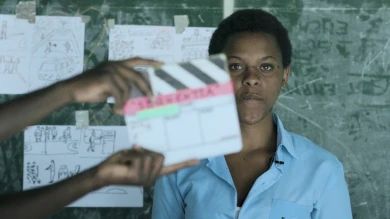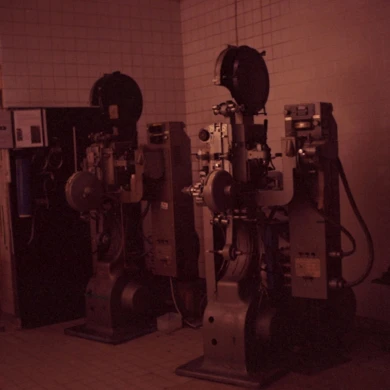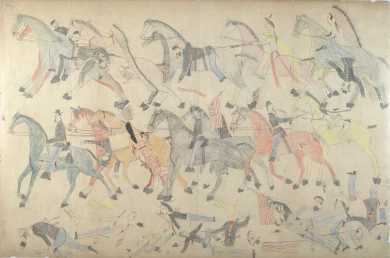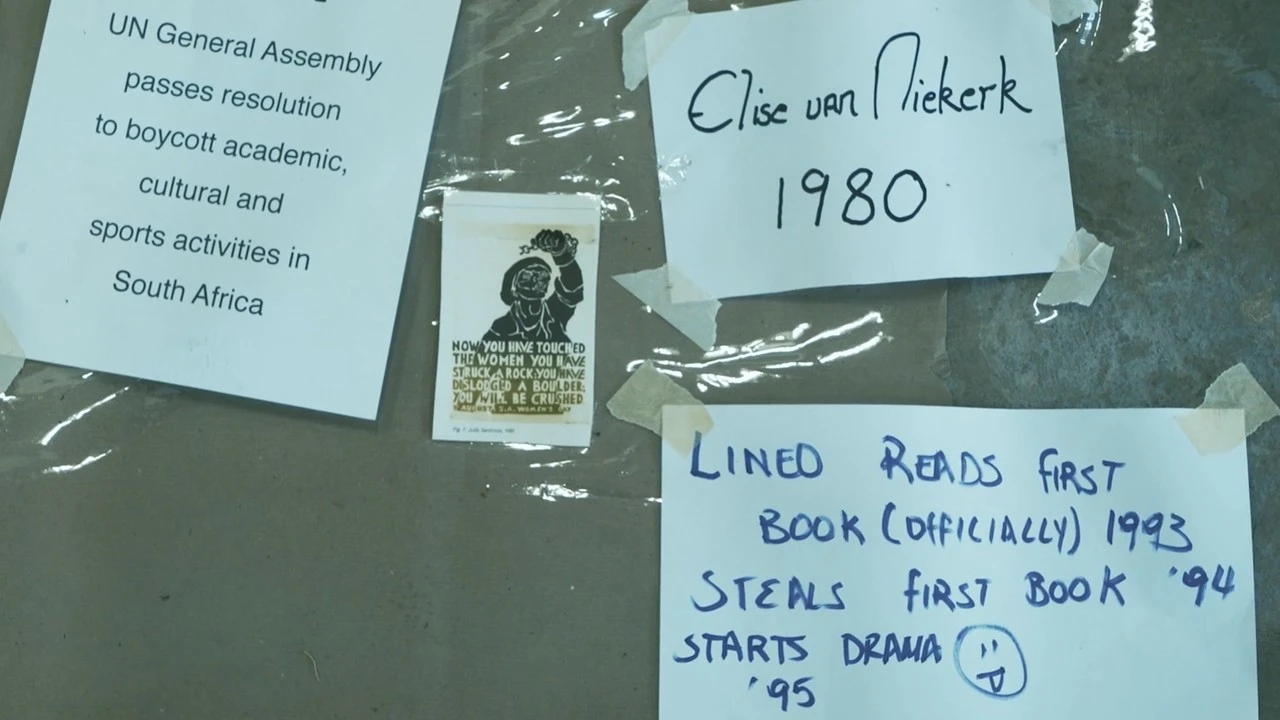Cinema Commons is a research, programming and publishing project which explores how film and sound experiences articulate interpretive communities, fostering collective debate and devising proposals for common spaces. Constructed in two annual editions, this year it will explore three core strands: the alternative film society as a place of utopia and resistance, with film curators Miriam Martín and Ana Useros; the work of artist Christian Nyampeta and the École du soir, a learning collective focused on African diaspora and inspired by the trailblazing Senegalese film-maker Ousmane Sembène; and the union between activism and celluloid, machine and poetry, in the L’Abominable Laboratory, located on the outskirts of Paris.
The project addresses processes of socialisation and film’s potential beyond the image, with this edition bringing together different practices which explore film’s capacity to assemble and produce common spaces, understood in architectural, social and political terms. Film has always been a decisive tool in struggles for emancipation and, setting out from this genealogy, the proposals in this edition look to understand the role it can play in today’s cultural and political context, overcoming the dominant forms of representation and its modes of distribution to advance towards an ethics of life in common.
Free admission until full capacity is reached. Tickets may be collected at the Museo’s Ticket Offices from 10am on 20 October, and on the Museo Reina Sofía website starting three days before each session (a maximum of 2 per person). 20% of the visitor-capacity will be reserved for attendance without ticket collection on the day of the activity. Doors open 30 minutes before each screening
LOCATION
Sabatini Building, Cinema
CAPACITY
129 people
Free admission until full capacity is reached. Tickets may be collected at the Museo’s Ticket Offices from 10am on 20 October, and on the Museo Reina Sofía website starting three days before each session (a maximum of 2 per person). 20% of the visitor-capacity will be reserved for attendance without ticket collection on the day of the activity. Doors open 30 minutes before each screening
LOCATION
Sabatini Building, Cinema
CAPACITY
129 people
Inside the Framework of
Organised by
Museo Reina Sofía
The activities in this programme

Christian Nyampeta and the École du soir
Past activity
This second instalment of Cinema Commons, a research, programming and publishing project which explores how film articulates interpretive communities, fosters collective debate and devises proposals for common space, comprises three sessions with Rwandan artist, musician and film-maker Christian Nyampeta and Ècole du soir. The programme’s first session screens video works made by Nyampeta, while the second sets forth a dialogue on the creative processes of Ècole du soir. The third brings proceedings to a close with the screening of a film selected by the artist: Ousmane Sembène’s Guelwaar (1992).
The work of Christian Nyampeta encompasses pedagogies and community forms of knowledge production and transmission. His Ècole du soir (Evening School) is an art project conceived as a mobile space of collective learning and is named in homage to Ousmane Sembène (1923–2007), a pioneer of African cinema who defined his films as “evening classes” for the people, a medium of education and emancipation through culture.
The New York-based artist from Rwanda uses art and museums to create spaces of encounter and common learning that predate colonial education models. Via popular culture frames of reference like comics, music and film, Nyampeta develops dynamics and spaces from which to build experiences which redress the wounds of diaspora and its consequences; further, his work recovers, makes visible and heals — through a pedagogical and artistic process — the social divides of the African people. With Ècole du soir he also works on creations without authorship and uses the counter-ethnographic legacy of novelist and film-maker Ousmane Sembène as a tool to deconstruct the Western view of Africa.

Long Live L’Abo! Celluloid and Activism
Past activity
The third instalment of Cinema Commons, a research, programming and publishing project which explores how film articulates interpretive communities, fosters collective debate and devises proposals for common spaces, presents L’Abominable, an artist- and film-maker-run independent film-lab founded in 1996 on the outskirts of Paris. The programme is structured around three sessions: a lecture-workshop on L’Abominable, conducted by film-makers Pilar Monsell and Camilo Restrepo; a session of short films in 16mm produced in L’Abominable; and the feature-length film Une île et une nuit (An Island and One Night), made by the Les Pirates des Lentillères collective.
Better known by the shortened version of L’Abo, the artist-run laboratory emerged in response to disappearing infrastructures in artisan film-making and endeavours to offer the creative community a self-managed space in which to produce, develop and screen films in analogue formats such as Super8, 16mm and 35mm. With this underpinning, L’Abo champions the aesthetic and political experimentation of analogue cinema opposite digital hegemony.
L'Abominable, more than a simple work tool, has become a space of artistic and social exchange which has knitted together a community. It is characterised by endowing technique with a poetic dimension, in a community that manufactures its own film devices, and situates pedagogy at its core — the film-makers and artists train one another on common ground. Further, it seeks to forge an opening to all experimental languages around celluloid, for instance installation and film performance, while constituting a place of preservation and conservation in the history of the medium.
L'Abominable is an example of how, at the height of the digital age, artists and film-makers are recovering cinematography and vindicating the production process in its entirety. This autonomy invents alternative routes in the industry as it creates new tools, develops other forms of expression and explores unknown cinematic territories.

On the Art of Occupying Spaces and Curating Film Programmes
Past activity
On the Art of Occupying Spaces and Curating Film Programmes is a film programme overseen by Miriam Martín and Ana Useros, and the first within the project The Cinema and Sound Commons. The activity includes a lecture and two films screened twice in two different sessions: John Ford’s Fort Apache (1948) and John Gianvito’s The Mad Songs of Fernanda Hussein (2001).
“By virtue of a group of film curator enthusiasts, small plazas and vacant lots in Madrid’s Lavapiés neighbourhood became cinemas with the arrival of summer. The city streets made room for everyone: the local residents who came down with their seats tucked under their arms, or those who simply came across the Lavapiés Film Festival with no prior knowledge of it, but knowing how to recognise a free and convivial film screening, as enticing as light is to moths. The Festival’s film curators had to first reach a consensus with one another, by assembly, and then with others, addressing issues ranging from electricity to the transfer of rights to show the films.
Whereas the annually organised Festival resembled a camp, the weekly CSOA (Squatted Self-managed Social Centre) La Morada film society looked more like a settlement. In each squatted social centre, a micro civilisation is founded, and nestled among its infrastructures is always a film society. Why? We’ll see. A direct outcome of the 15M anti-austerity movement, this film society was contentless in form (the content, the films, were decided upon from session to session). Anyone was free to enter, and therefore free to curate the line-up, although not haphazardly — there was a method, ultimately devised so the community would not close, so it would never have one set image of itself.
Part of this method entailed relating the film from the following week to the recently viewed one, and the same method has gone into putting together this two-session programme. The Festival and the film society were, moreover, attempts at rectification: the festival logic and the very same film-club logic, according to which film boils down to an excuse for debating serious issues. There would be nothing to debate but much to ponder. For instance, about the manufacturing of enemies by a nation that chooses enemies in the world, with one film from the year the State of Israel was proclaimed and another from the year the Twin Towers were razed to the ground. The USA manufactures functional enemies and heroes and American cinema, in addition to showing us this, manufactures unforgettable characters: the Apache chief, Cochise, and mother courage, Fernanda Hussein. We’ll see”.
Miriam Martín and Ana Useros
More activities

Difficulty. Forms and Political Effects of Deviation in Writing and Contemporary Art
23 February – 14 December 2026 – Check programme
Difficulty. Forms and Political Effects of Deviation in Writing and Contemporary Art is a study group aligned towards thinking about how certain contemporary artistic and cultural practices resist the referentiality that dominates the logics of production and the consumption of present-day art. At the centre of this proposal are the concepts of difficulty and deviation, under which it brings together any procedure capable of preventing artistic forms from being absorbed by a meaning that appears previous to and independent from its expression. By ensuring the perceptibility of their languages, difficulty invites us to think of meaning as the effect of a signifying tension; that is, as a productive and creative activity which, from the materiality of art objects, frees aesthetic experience from the representational mandate and those who participate in it from the passiveness associated with tasks of mimesis and decoding.
The economy of the referential norm translates the social logic of capitalism, where insidious forms of capturing subjectivity and meaning operate. In the early 1980s, and adopting a Marxist framework, poet Ron Silliman highlighted how this logic entailed separating language from any mark, gesture, script, form or syntax that might link it to the conditions of its production, rendering it fetichised (as if without a subject) and alienating its users in a use for which they are not responsible. This double dispossession encodes the political strategy of referential objectivity: with no subject and no trace of its own consistency, language is merely an object, that reality in which it disappears.
The political uses of referentiality, more sophisticated today than ever before, sustain the neoliberal-extractivist phase of capitalism that crosses through present-day societies politically, economically and aesthetically. Against them, fugitive artistic practices emerge which, drawing from Black and Queer studies and other subaltern critical positions, reject the objective limits of what exists, invent forms to name what lies outside what has already been named, and return to subjects the capacity to participate in processes of emission and interpretation.
Read from the standpoint of artistic work, the objective capture of referentiality may be called transparency. Viewed from a social contract that reproduces inequality in fixed identity positions, transparent in this objectivity are, precisely, the discourses that maintain the status quo of domination. Opposite the inferno of these discourses, this group aims to collectively explore, through deviant or fugitive works, the paradise of language that Monique Wittig encountered in the estranged practices of literature. For the political potency of difficulty — that is, its contribution to the utopia of a free language among equals — depends on making visible, first, its own deviations; from there, the norm that those deviations transgress; and finally, the narrowness of a norm which in no way exhausts the possibilities ofsaying, signifying, referring and producing a world.
From this denouncement of referential alienation, fetishisation and capture, Difficulty. Forms and Political Effects of Deviation in Writing and Contemporary Art turns its attention to the strategies of resistance deployed by contemporary artists and poets. Its interest is directed towards proposals as evidently difficult or evasive as those of Gertrude Stein, Lyn Hejinian, Theresa Hak Kyung Cha, Kameelah Janan Rasheed, Kathy Acker, María Salgado and Ricardo Carreira, and as seemingly simple as those of Fernanda Laguna, Felix Gonzalez Torres and Cecilia Vicuña, among other examples that can be added according to the desires and dynamics of the group.
The ten study group sessions, held between February and December, combine theoretical seminars, work with artworks from the Museo Reina Sofía’s Collections and exhibitions, reading workshops and public programs. All these formats serve as spaces of encounter to think commonly about certain problems of poetics — that is, certain political questions — of contemporary writing and art.
Difficulty. Forms and Political Effects of Deviation in Writing and Contemporary Art inaugurates the research line Goodbye, Representation, through which the Museo Reina Sofía’s Studies Directorship seeks to explore the emergence of contemporary artistic and cultural practices which move away from representation as a dominant aesthetic-political strategy and redirect their attention toward artistic languages that question the tendency to point, name and fix, advocating instead for fugitive aesthetics. Over its three-year duration, this research line materializes in study groups, seminars, screenings and other forms of public programming.

Institutional Decentralisation
Thursday, 21 May 2026 – 5:30pm
This series is organised by equipoMotor, a group of teenagers, young people and older people who have participated in the Museo Reina Sofía’s previous community education projects, and is structured around four themed blocks that pivot on the monstrous.
This fourth and final session centres on films that take the museum away from its axis and make it gaze from the edges. Pieces that work with that which is normally left out: peripheral territories, unpolished aesthetics, clumsy gestures full of intent. Instead of possessing an institutional lustre, here they are rough, precarious and strange in appearance, legitimate forms of making and showing culture. The idea is to think about what happens when central authority is displaced, when the ugly and the uncomfortable are not hidden, when they are recognised as part of the commons. Film that does not seek to be to one’s liking, but to open space and allow other ways of seeing and inhabiting the museum to enter stage.

Intergenerationality
Thursday, 9 April 2026 – 5:30pm
This series is organised by equipoMotor, a group of teenagers, young people and older people who have participated in the Museo Reina Sofía’s previous community education projects, and is structured around four themed blocks that pivot on the monstrous.
The third session gazes at film as a place from which to dismantle the idea of one sole history and one sole time. From a decolonial and queer perspective, it explores films which break the straight line of past-present-future, which mix memories, slow progress and leave space for rhythms which customarily make no room for official accounts. Here the images open cracks through which bodies, voices and affects appear, disrupting archive and questioning who narrates, and from where and for whom. The proposal is at once simple and ambitious: use film to imagine other modes of remembering, belonging and projecting futures we have not yet been able to live.

Remedios Zafra
Thursday March 19, 2026 - 19:00 h
The José Luis Brea Chair, dedicated to reflecting on the image and the epistemology of visuality in contemporary culture, opens its program with an inaugural lecture by essayist and thinker Remedios Zafra.
“That the contemporary antifeminist upsurge is constructed as an anti-intellectual drive is no coincidence; the two feed into one another. To advance a reactionary discourse that defends inequality, it is necessary to challenge gender studies and gender-equality policies, but also to devalue the very foundations of knowledge in which these have been most intensely developed over recent decades—while also undermining their institutional support: universities, art and research centers, and academic culture.
Feminism has been deeply linked to the affirmation of the most committed humanist thought. Periods of enlightenment and moments of transition toward more just social forms—sustained by education—have been when feminist demands have emerged most strongly. Awareness and achievements in equality increase when education plays a leading social role; thus, devaluing intellectual work also contributes to harming feminism, and vice versa, insofar as the bond between knowledge and feminism is not only conceptual and historical, but also intimate and political.
Today, antifeminism is used globally as the symbolic adhesive of far-right movements, in parallel with the devaluation of forms of knowledge emerging from the university and from science—mistreated by hoaxes and disinformation on social networks and through the spectacularization of life mediated by screens. These are consequences bound up with the primacy of a scopic value that for some time has been denigrating thought and positioning what is most seen as what is most valuable within the normalized mediation of technology. This inertia coexists with techno-libertarian proclamations that reactivate a patriarchy that uses the resentment of many men as a seductive and cohesive force to preserve and inflame privileges in the new world as techno-scenario.
This lecture will address this epochal context, delving into the synchronicity of these upsurges through an additional parallel between forms of patriarchal domination and techno-labor domination. A parallel in which feminism and intellectual work are both being harmed, while also sending signals that in both lie emancipatory responses to today’s reactionary turns and the neutralization of critique. This consonance would also speak to how the perverse patriarchal basis that turns women into sustainers of their own subordination finds its equivalent in the encouraged self-exploitation of cultural workers; in the legitimation of affective capital and symbolic capital as sufficient forms of payment; in the blurring of boundaries between life and work and in domestic isolation; or in the pressure to please and comply as an extended patriarchal form—today linked to the feigned enthusiasm of precarious workers, but also to technological adulation. In response to possible resistance and intellectual action, patriarchy has associated feminists with a future foretold as unhappy for them, equating “thought and consciousness” with unhappiness—where these have in fact been (and continue to be) levers of autonomy and emancipation.”
— Remedios Zafra

27th Contemporary Art Conservation Conference
Wednesday, 4, and Thursday, 5 March 2026
The 27th Contemporary Art Conservation Conference, organised by the Museo Reina Sofía’s Department of Conservation and Restoration, with the sponsorship of the Mapfre Foundation, is held on 4 and 5 March 2026. This international encounter sets out to share and debate experience and research, open new channels of study and reflect on conservation and the professional practice of restorers.
This edition will be held with in-person and online attendance formats, occurring simultaneously, via twenty-minute interventions followed by a five-minute Q&A.
